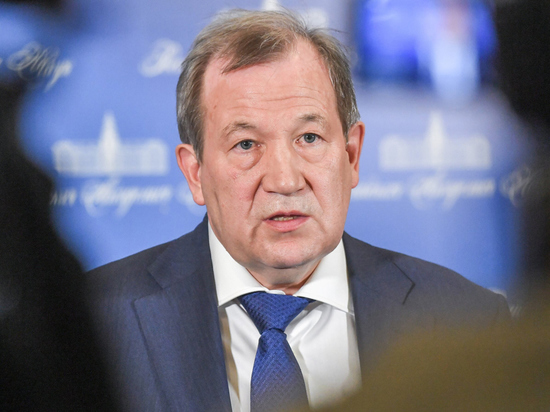Russian Academy of Sciences solves the problem of import substitution: gravimeters need domestic lasers
[ad_1]

The projects that can become the basis of the roadmap in the direction of “Quantum sensors” were recently considered by members of the Council of the Russian Academy of Sciences for Quantum Technologies together with representatives of the state corporation Rostec. As previously reported, the meeting on high-tech developments held in early February was the third since December last year.
The Chairman of the Council, President of the Russian Academy of Sciences, Gennady Krasnikov, who opened the meeting, noted the special importance of quantum technologies for raising the scientific and technological level of the country. He reminded the audience that quantum sensors are a very important area that has a synergistic effect on other previously adopted roadmaps: Quantum Computing and Quantum Communications, and therefore urged Council members to pay close attention to the projects proposed by Rostec.
The VNIIFTRI Institute (Russian Metrological Center) was the first to present three of its developments at once. Its superminiature (matchbox-sized) quantum frequency standard, or simply a quantum clock, is a source of high-precision synchronization in time and frequency, which is completely ready for mass production and even surpasses foreign analogues in some parameters, for example, in energy consumption. According to Vitaly Palchikov, chief researcher of the institute, it is necessary for the development of modern robotic systems, unmanned aerial vehicles, etc. In order to make mass production, it is necessary to start producing, by and large, only a couple of necessary components. The head of one of the research institutes, who was present in the meeting room, emphasized that, in principle, the required components have been developed, but are at the stage of development work – a decision from above is needed to put them into serial production.
The next development was the atomic gravimeter. This is a measuring complex that quickly and with high accuracy measures the parameters of the Earth’s gravitational field. First of all, a gravimeter is needed for geodetic work, prediction of tectonic shifts and earthquake forecasting, and in leading countries it is already used for these purposes. For example, some oil-producing company needs to understand where oil and gas-bearing shelves lie underground. A traditional instrument based on a corner reflector can determine the presence of voids or certain dense rocks underground in only 24 hours, while the Russian atomic gravimeter can do this in an hour, determining the gravitational potential with an accuracy of up to the ninth decimal place.
However, our Western “partners” go further – they decided to create a gravitational map of the Earth using such gravimeters (by the way, this idea was proposed back in the 60s by a Russian scientist, academician of the Russian Academy of Sciences Vladislav Pustovoit). Do you remember what the geoid looks like – the globe, or rather its gravity field, depicted as an uneven potato? Here is something similar, but this time made not with the help of mathematical calculations, but on the basis of more accurate gravimetric measurements around the world, physicists want to create.
At the Council for Quantum Technologies, atomic sensors from the Institute for System Analysis of the Russian Academy of Sciences, electric field sensors, and spintronic magnetic sensors of the Russian Quantum Center, which can also be used in vehicles, navigation devices and drones, were presented.
All this, according to the plan of the specialists of the state corporation, had to meet three main criteria. Firstly, to meet the definition of “quantum sensors” (that is, due to the properties of quantum systems, including superposition and entanglement, have a higher sensitivity compared to classical ones). Secondly, to have a technology readiness level of at least the fourth (that is, to have a prototype and laboratory tests). Thirdly, to be able to “commercialize and return on investment.”
On the last criterion, the curator of the direction from the Civil Code, Anna Sharipova, who was present at the meeting, especially drew attention. In particular, she noted that Chinese counterparts may be cheaper, and therefore Russian scientists will have to work hard to prove in what else, if not in price, they can outperform competitors.
The members of the Council who spoke afterwards expressed the wish that the state corporation should significantly expand the scope of their list, because in addition to the announced developments, there are lasers, optical means, photonics elements, without which the named sensors and gravimeters “will not be able to perform their functionality” …
“Some projects are ready to the point that you can even launch them tomorrow, but some are a step backwards,” one of the speakers expressed his opinion.
Sergey Pavlovich Kulik, the scientific director of the Center for Quantum Technologies of the Faculty of Physics of Moscow State University, generally noted that in order to correctly assess the proposed projects, the Council would need to create a group of experts to travel to the field.
Speaking after everyone, Gennady Krasnikov summed up the meeting: “I talked with the curator (from Rostec) for a long time on this roadmap, noting that this is one of the most sought-after works. There is great synergy here with other roadmaps. The first step has been taken – Rostec has begun to select projects. But in my opinion, I approached this quite simply: not all projects are presented here, we are waiting for more projects that we would like to see.” In addition, he noted that in this direction, not everything should be reduced to price. The head of the Academy stressed that there are key positions on quantum sensors, very critical technologies that Russia, in any situation, must produce independently. These are the same lasers, single-photon receivers …
The President of the Russian Academy of Sciences also noted one important thing: when choosing projects, it is necessary to observe their technological interconnectedness and integrity. And he liked the idea of creating a visiting commission of the Council.
[ad_2]
Source link








